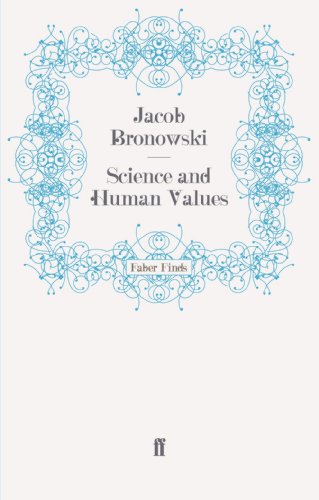Two Visions of Science
g. When Shelley pictured science as a modern Prometheus who would wake the world to a wonderful dream of Godwin, he was alas too simple. But it is as pointless to read what has happened since as a nightmare. Dream or nightmare, we have to live our experience as it is, and we have to live it awake. We live in a world which is penetrated through and through by science, and which is both whole and real. We cannot turn it into a game simply by taking sides.
And this make-believe game might cost us what we value most: the human content of our lives. The scholar who dis¬ dains science may speak in fun, but his fun is not quite a laughing matter. To think of science as a set of special tricks, to see the scientist as the manipulator of outlandish skills— this is the root of the poison mandrake which flourishes rank in the comic strips. There is no more threatening and no more degrading doctrine than the fancy that somehow we may shelve the responsibility for making the decisions of our society by passing it to a few scientists armored with a special magic. This is another dream, the dream of H. Cr. Wells, in which the tall elegant engineers rule, with perfeet benevolence, a humanity which has no business except to be happy. To H. G. Wells, this was a dream of heaven — a modern version of the idle, harp-resounding heaven of other childhood pieties. But in fact it is the picture of a slave society, and should make us shiver whenever we hear a man of sensibility dismiss science as someone else's concern. The world today is made, it is powered by science; and for any man to abdicate an interest in science is to walk with open eyes towards slavery.
Notes:
Shelly's view of science as a liberator versus HG Wells vision of science as an elitist endeavor, leaving the populace slaves to its whims.
Folksonomies: science philosophy society values
Taxonomies:
/science (0.621153)
/education/school (0.360233)
/health and fitness/exercise (0.354222)
Keywords:
HG Wells vision (0.995405 (neutral:0.000000)), Shelley pictured science (0.984371 (positive:0.529491)), sensibility dismiss science (0.911715 (negative:-0.336367)), H. G. Wells (0.857326 (neutral:0.000000)), tall elegant engineers (0.844244 (positive:0.509974)), Science Shelly (0.737360 (neutral:0.000000)), elitist endeavor (0.733704 (neutral:0.000000)), modern Prometheus (0.696514 (positive:0.529491)), wonderful dream (0.693386 (positive:0.529491)), dains science (0.679697 (positive:0.379272)), degrading doctrine (0.678712 (neutral:0.000000)), make-believe game (0.678467 (positive:0.679198)), outlandish skills— (0.670579 (negative:-0.217031)), poison mandrake (0.664770 (negative:-0.217031)), perfeet benevolence (0.661249 (positive:0.536934)), laughing matter (0.658815 (neutral:0.000000)), human content (0.655030 (positive:0.523865)), comic strips (0.648241 (negative:-0.217031)), H. Cr (0.647371 (neutral:0.000000)), slave society (0.643470 (neutral:0.000000)), special tricks (0.643416 (positive:0.338625)), special magic (0.636971 (neutral:0.000000)), harp-resounding heaven (0.636262 (neutral:0.000000)), open eyes (0.635158 (neutral:0.000000)), childhood pieties (0.631205 (neutral:0.000000)), modern version (0.628281 (neutral:0.000000)), world (0.536089 (positive:0.529491)), nightmare (0.479413 (negative:-0.831780)), fun (0.473348 (positive:0.379272)), liberator (0.471566 (neutral:0.000000))
Entities:
HG Wells:Company (0.896306 (neutral:0.000000)), H. G. Wells:Person (0.874819 (neutral:0.000000)), Godwin:Person (0.707870 (positive:0.058084)), Shelley:Person (0.599058 (positive:0.529491)), scientist:JobTitle (0.549077 (negative:-0.217031)), H. Cr:Person (0.538344 (neutral:0.000000))
Concepts:
Slavery (0.962396): dbpedia | freebase | opencyc
Science fiction (0.852807): dbpedia | freebase
Slavery in the United States (0.793629): dbpedia | freebase
Science (0.718789): dbpedia | freebase | opencyc
Scientist (0.660916): dbpedia | freebase | opencyc
Mary Shelley (0.635514): dbpedia | freebase | opencyc | yago
Men Like Gods (0.617123): dbpedia | freebase | yago
HTC Magic (0.566180): dbpedia | freebase





